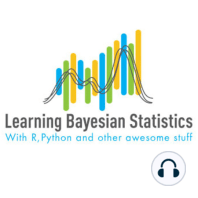49 min listen

#18 How to ask good Research Questions and encourage Open Science, with Daniel Lakens
#18 How to ask good Research Questions and encourage Open Science, with Daniel Lakens
ratings:
Length:
58 minutes
Released:
Jun 18, 2020
Format:
Podcast episode
Description
How do you design a good experimental study? How do you even know that you’re asking a good research question? Moreover, how can you align funding and publishing incentives with the principles of an open source science?
Let’s do another “big picture” episode to try and answer these questions! You know, these episodes that I want to do from time to time, with people who are not from the Bayesian world, to see what good practices there are out there. The first one, episode 15, was focused on programming and python, thanks to Michael Kennedy.
In this one, you’ll meet Daniel Lakens. Daniel is an experimental psychologist at the Human-Technology Interaction group at Eindhoven University of Technology, in the Netherlands. He’s worked there since 2010, when he received his PhD in social psychology.
His research focuses on how to design and interpret studies, applied meta-statistics, and reward structures in science. Daniel loves teaching about research methods and about how to ask good research questions. He even crafted free Coursera courses about these topics.
A fervent advocate of open science, he prioritizes scholar articles review requests based on how much the articles adhere to Open Science principles. On his blog, he describes himself as ‘the 20% Statistician’. Why? Well, he’ll tell you in the episode…
Our theme music is « Good Bayesian », by Baba Brinkman (feat MC Lars and Mega Ran). Check out his awesome work at https://bababrinkman.com/ (https://bababrinkman.com/) !
Links from the show:
Daniel's website: https://sites.google.com/site/lakens2/Home?authuser=0 http://daniellakens.blogspot.com/ https://github.com/Lakens https://twitter.com/lakens?ref_src=twsrc%5Etfw https://scholar.google.nl/citations?user=ZbqYyrsAAAAJ&hl=nl https://www.coursera.org/learn/statistical-inferences https://www.coursera.org/learn/improving-statistical-questions https://opennessinitiative.org/ https://www.theatlantic.com/science/archive/2018/04/the-scientific-paper-is-obsolete/556676/ (https://sites.google.com/site/lakens2/Home)
The 20% Statistician: http://daniellakens.blogspot.com/ (http://daniellakens.blogspot.com/)
Daniel on GitHub: https://github.com/Lakens (https://github.com/Lakens)
Daniel on Twitter: https://twitter.com/lakens (https://twitter.com/lakens)
Daniel on Google Scholar: https://scholar.google.nl/citations?user=ZbqYyrsAAAAJ&hl=nl (https://scholar.google.nl/citations?user=ZbqYyrsAAAAJ&hl=nl)
Coursera Course -- Improving your statistical inferences: https://www.coursera.org/learn/statistical-inferences (https://www.coursera.org/learn/statistical-inferences)
Coursera Course -- Improving Your Statistical Questions: https://www.coursera.org/learn/improving-statistical-questions (https://www.coursera.org/learn/improving-statistical-questions)
Peer Reviewers' Openness Initiative: https://opennessinitiative.org/ (https://opennessinitiative.org/)
The Scientific Paper Is Obsolete -- Here’s what’s next: https://www.theatlantic.com/science/archive/2018/04/the-scientific-paper-is-obsolete/556676/ (https://www.theatlantic.com/science/archive/2018/04/the-scientific-paper-is-obsolete/556676/)
This podcast uses the following third-party services for analysis:
Podcorn - https://podcorn.com/privacy
Let’s do another “big picture” episode to try and answer these questions! You know, these episodes that I want to do from time to time, with people who are not from the Bayesian world, to see what good practices there are out there. The first one, episode 15, was focused on programming and python, thanks to Michael Kennedy.
In this one, you’ll meet Daniel Lakens. Daniel is an experimental psychologist at the Human-Technology Interaction group at Eindhoven University of Technology, in the Netherlands. He’s worked there since 2010, when he received his PhD in social psychology.
His research focuses on how to design and interpret studies, applied meta-statistics, and reward structures in science. Daniel loves teaching about research methods and about how to ask good research questions. He even crafted free Coursera courses about these topics.
A fervent advocate of open science, he prioritizes scholar articles review requests based on how much the articles adhere to Open Science principles. On his blog, he describes himself as ‘the 20% Statistician’. Why? Well, he’ll tell you in the episode…
Our theme music is « Good Bayesian », by Baba Brinkman (feat MC Lars and Mega Ran). Check out his awesome work at https://bababrinkman.com/ (https://bababrinkman.com/) !
Links from the show:
Daniel's website: https://sites.google.com/site/lakens2/Home?authuser=0 http://daniellakens.blogspot.com/ https://github.com/Lakens https://twitter.com/lakens?ref_src=twsrc%5Etfw https://scholar.google.nl/citations?user=ZbqYyrsAAAAJ&hl=nl https://www.coursera.org/learn/statistical-inferences https://www.coursera.org/learn/improving-statistical-questions https://opennessinitiative.org/ https://www.theatlantic.com/science/archive/2018/04/the-scientific-paper-is-obsolete/556676/ (https://sites.google.com/site/lakens2/Home)
The 20% Statistician: http://daniellakens.blogspot.com/ (http://daniellakens.blogspot.com/)
Daniel on GitHub: https://github.com/Lakens (https://github.com/Lakens)
Daniel on Twitter: https://twitter.com/lakens (https://twitter.com/lakens)
Daniel on Google Scholar: https://scholar.google.nl/citations?user=ZbqYyrsAAAAJ&hl=nl (https://scholar.google.nl/citations?user=ZbqYyrsAAAAJ&hl=nl)
Coursera Course -- Improving your statistical inferences: https://www.coursera.org/learn/statistical-inferences (https://www.coursera.org/learn/statistical-inferences)
Coursera Course -- Improving Your Statistical Questions: https://www.coursera.org/learn/improving-statistical-questions (https://www.coursera.org/learn/improving-statistical-questions)
Peer Reviewers' Openness Initiative: https://opennessinitiative.org/ (https://opennessinitiative.org/)
The Scientific Paper Is Obsolete -- Here’s what’s next: https://www.theatlantic.com/science/archive/2018/04/the-scientific-paper-is-obsolete/556676/ (https://www.theatlantic.com/science/archive/2018/04/the-scientific-paper-is-obsolete/556676/)
This podcast uses the following third-party services for analysis:
Podcorn - https://podcorn.com/privacy
Released:
Jun 18, 2020
Format:
Podcast episode
Titles in the series (100)
#4 Dirichlet Processes and Neurodegenerative Diseases, with Karin Knudson by Learning Bayesian Statistics